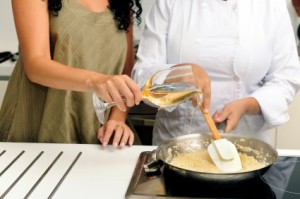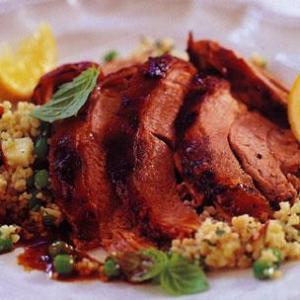 Wine can be too expensive to include in your cooking budget. Or you might just not want to use it. Well, that's no problem, because there are good, healthy substitutes for it. Cranberry juice is an excellent substitute for red wine, just choose the kind with as little sugar added as possible.
Wine can be too expensive to include in your cooking budget. Or you might just not want to use it. Well, that's no problem, because there are good, healthy substitutes for it. Cranberry juice is an excellent substitute for red wine, just choose the kind with as little sugar added as possible.
To substitute for white wine, I like apple juice, but white grape juice can be used. In dishes where the wine is not the dominant flavor, I really can't see any difference in the results. Using the juice is healthy, for you, and for your budget.
Source: I don't remember which cook book it was in, but cranberry juice was suggested as a good substitute for red wine. I started using apple juice on a hunch that it would be just as good a substitute.
By Free2B from North Royalton, OH
This page contains the following solutions.
I have tried many things but cranberry juice works the best as a wine substitute. It has just the right amount of tartness and sweetness to taste very similar to wine.
Here are the questions asked by community members. Read on to see the answers provided by the ThriftyFun community.
What is a good non-alcoholic substitute for red wine or white wine in recipes?
Sabrina from Golden, CO
If the recipe involves cooking the wine, the alcohol will evaporate off anyway, so it won't end up alcoholic.
I've seen chicken stock as a substitute, and sometimes apple juice.
grape juice, red or white just like the wine called for in the recipe.
i have bough DEALCHONIZED WINE. hard to say and even harder to spell. i bought it at a liquor stor. there is no alcohol in it. tastes like wine.
Not all wine will evap. when you cook with it!
Nonalcoholic Substitutions
For soups and pan sauces use extra broth and add red or white wine vinegar or lemon juice right before serving using the following ratios:
To replace 1/2 cup wine use:
1/2 cup broth + 1 teaspoon wine vinegar
1/2 cup broth + 1 teaspoon lemon juice
Wine, Red
Note: add water, white grape juice, apple juice, or broth, if necessary, to get the specified amount of liquid called for in the recipe. or Grape juice; vegetable stock; cranberry juice; tomato juice; or concord grape jelly.
1/4 cup or more red wine, substitute the following:
equal measure of red grape juice, cranberry juice, apple cider, chicken broth, clam juice, flavored vinegar, or nonalcoholic wine. If you use nonalcoholic wine, add a tablespoon of vinegar to cut the sweetness
Wine, White
White grape juice; apple cider; apple juice; vegetable stock; or water
1/4 cup or more white wine, substitute the following:
equal measure of white grape juice, chicken broth, vegetable broth, clam juice or nonalcoholic wine.
Wine, White, Dry
Water, chicken broth, bullion or consommé, gingerale, white grape juice, diluted cider vinegar or white wine vinegar, liquid from canned mushrooms.
Wine, Heavy
For 1/4 cup or more port, sweet sherry, rum, brandy, liqueur, substitute the following: equal measure of unsweetened orange juice or apple juice plus 1 teaspoon of corresponding flavored extract or vanilla extract.
General Marinade Substitutes
Substitute for 1 cup of alcohol with:
1 cup of citrus juice, lemonade, pineapple or orange juice.
1/2 cup of fresh lemon juice or orange juice.
1 cup of tomato juice diluted by 1/4 with water or vinegar.
1/2 cup of light soy sauce and 1/2 cup of citrus juice.
1/2 cup of light soy sauce and 2 tablespoons of peanut oil.
that is true and the amount is so miniscule..whatever....it does not matter
Alcohol/Liqueur
When making substitutions for alcohols, it is important to keep the volume of liquid in the recipe the same as originally called for. Depending on the recipe, apple juice or chicken broth often makes a good substitution for wine. When using flavored liqueurs, extracts can be substituted if you make up the balance of the liquid with water.
Regarding how much alcohol, if any, remains in a dish after cooking: there are several variables to consider. How much alcohol was added, how long and how hot it was cooked, was it cooked in an open or covered pot, etc. I suspect a tiny amount will remain, regardless. The reason I think so is the note on non-alcoholic beer which states, "Contains less than 0.5% alcohol by vol.". To the best of my knowledge the way it's made is they brew beer, then remove the alcohol and carbonation, then pump the carbonation back into it. I presume they've found it impossible to remove all the alcohol, and the Feds decided if it had half a percent or more of alcohol it would be taxed as beer.
One word of encouragement here: I've been cooking with various spirits for years, almost never using water except to make stock. I had developed a killer hot dog chili recipe that involved heating beer and mixing it in with the broken-up ground beef. A dear friend of mine has a church friend who is dying of cancer, and who happens to love hot dogs. She wanted to take him a few so she called and asked if I had any chili. I did and told her she was welcome to it, but then she asked if it had any beer in it; turned out her friend couldn't have any alcohol at all because of some medication he was taking. So I decided to make a small batch using water instead of beer, and another small batch uxing my regular 'with beer' recipe at the same time, to be sure the only difference between them was the beer. My friend had been trying to convince me to leave the beer out, and I intended to prove to her that it needed to be there.
It didn't work out that way, though. When the two batches were done enough for a 'taste test', I tried both and discovered that, heck, I couldn't tell the difference! Now my chili no longer gets beer.
One other note though, if you have to avoid even trace amounts of alcohol please be aware that it can be found in all sorts of unsuspected places. Pure Vanilla extract contains quite a bit, as do many other extracts. Some salad dressings contain enough to be a problem. In short, pay very close attention to everything you eat or drink just to be safe.
i usually use either apple cider or juice or white grape juice.
Hey,
So my recipe calls for 1 cup of dry white wine- but it's for marinading lamb.
I saw the other suggestions, and they look great for chicken, fish or beef/pork, but I'm concerned that it will change the taste of the lamb.
I can't buy actual wine because my university prohibits alcohol. Any one have any suggestions? I might be able to buy wine-grapes juice (hope that makes sense) but it's kinda expensive. Lamb is a huge splurge, and I can't really afford too much more expense.
THANKS,
Cinna
PS I put a picture of the recipe here. :)

Actually its a myth that alcohol will evaporate when cooking, in fact its been shown that some and even all of te alcohol will remain depending on the methods used
I have used cherry juice as a substitute for red wine. I buy the baby food size jars, just right for most recipes.
To all of you who think there is some alcohol remaining after cooking - bravo! But, you are in the minority, because the rest of the world thinks the opposite, as I've learned over the past several years. My unfortunate situation is that about 5 years ago I developed an allergy to alcohol. It started with wine, and gradually went to the hard stuff.
I had also assumed that the alcohol would cook out, and it took several tries to realize that the persistent lump in my throat was coming from the food I had cooked with wine. In addition, I can't have red wine, white wine, or balsamic vinegar, and at any restaurant, all the good salad dressings are made with one of those vinegars.
I have to be very careful when eating out; some places there is up to 50% of the menu (or more) than I cannot eat. And I have to go through the mantra each and ever time - I tell the waiter I can't have anything cooked in alcohol, etc, and they always come back with "Oh, the alcohol cooks out." And I have to insist, and tell them that in my case, it does not matter.
So, I've finally decided to search for substitutes, because nowadays so many recipes call for alcohol and related products. I usually just avoid them, and keep looking for some recipe that does not call for alcohol. But now that I have some ideas, I won't have to skip over all of those otherwise great sounding recipes! I'm even wondering if I can use extracts as a substitution in a recipe that calls for, say, 2 tbs of Khaluha, Rum, etc. I know that extracts contain alcohol, but I've not had a problem when I've used them in cooking.
Any and all ideas welcome!
Having taken meds that prohibit alcohol I have found that using soft drinks as a substitute for wine in marinades is an excellent alternative. Cherry Dr Pepper, Coke, Pepsi, Sprite, ginger ale, 7-up, etc all provide very different flavor profiles in the same way wines do and using diet sodas diminishes sugar content.
What can I substitute for white wine in a recipe for cooking chicken?
By marty from Oklahoma City, OK
Apple juice can be used as a substitute for wine in recipes.
Apple juice or Cider Brandy extract,which is just flavoring.
I make linguine that calls for a small amount of white wine, I just use chicken broth.
I frecuently use a bit of beer (cerveza) (canned) or malta (without alcohol), Sometimes I prepare an onion/bit of beer/spices and a little of soy sauce.
I either use apple juice or cider or white grape juice.
I'm making an Italian pot roast, and it calls for dry red wine. Is there anything I can sub for that?
What can I use for a substitute?
By Bobbie
This page is about substituting sherry in a recipe. Wine and liqueur can be expensive to keep in the pantry for cooking.